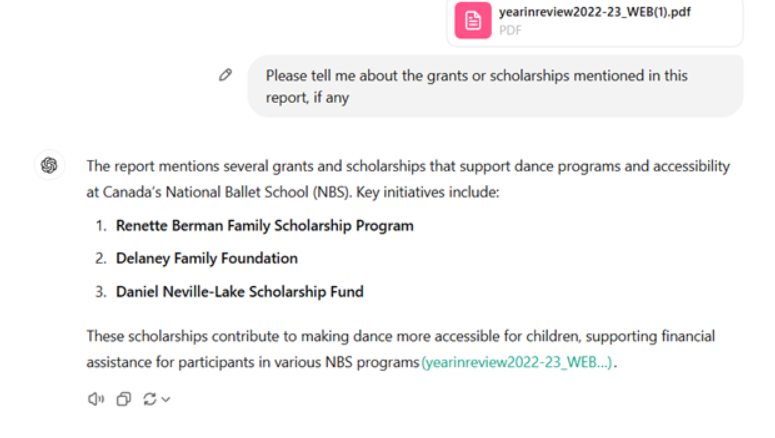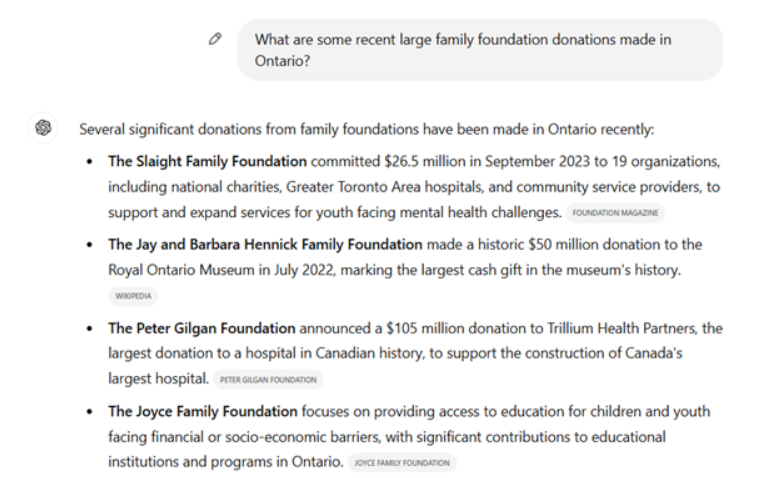As AI has taken the world by storm in recent years, we’re seeing it being implemented in our daily lives more than ever – it can help you write content, assist you with brainstorming, analyze data and so much more.
However, as the use of AI has grown rapidly with many positive applications, it has also raised some apprehensions and questions. Is the data I share with AI private? How accurate is AI generated data? How can I use AI in a meaningful way for prospect research? This post will aim to help answer some of those questions and provide some insight into how AI might be able to make your day easier as a prospect researcher!
Your Data Privacy
Data privacy is paramount in donor and prospect research. As you integrate various AI tools into your workflow, it is crucial to understand how your interaction data is being handled.
For example, one popular AI tool provider, OpenAI, states that their business-tier products do not use your interaction data by default to help improve their models. For individual-tier products, interaction data is used unless you manually opt-out in your account settings.
Anthropic, another popular provider, states that by default your interaction data will not be used unless you explicitly grant permission either through submitting feedback or reaching out to them directly.
By reviewing the usage policies of any AI tools you consider, you can confidently safeguard your data privacy while also taking advantage of the various benefits that AI has to offer.
Are AI Tools Accurate? The Short Answer: It Depends.
At their core, most AI tools are built on Large Language Models (LLMs), which generate responses by predicting the next word based on patterns learned from vast amounts of training data. This enables AI to excel at tasks like answering questions about well-known topics, drafting emails, or writing code.
However, AI isn’t perfect. Some tasks that are precise and rule-based – can challenge AI, which relies more on patterns and probabilities versus exact calculations. This is why the context you provide in your prompts can also have a significant impact on the accuracy of the responses you receive.
Providing clear context in your prompts can greatly improve the accuracy of AI responses. Since AI models rely on patterns rather than true understanding, they might misinterpret vague requests or lack the additional data needed to generate accurate results. By being specific and outlining exactly what you need, you help the AI produce answers that are more precise and aligned with your expectations, especially for tasks that require exactness and adherence to specific rules.
A practical example of this is CharityCAN’s AI generated summaries. To ensure we produce accurate summaries of prospect profiles, we provide the AI model with detailed information like donation history, board memberships, compensation and more. Additionally, we structure our prompts to ensure that only the provided data is used to create the summary. This ensures that the AI generates content that is relevant and specific to each profile. If we simply supplied the profile name, ambiguity could arise – the AI might mix up people with the same name or fill in gaps with incorrect information. This highlights how providing clear and detailed context greatly improves the accuracy of AI generated data.
Practical Applications of AI in Prospect Research
Now that we’ve covered the details surrounding AI tools and data privacy and accuracy, how exactly can AI assist prospect researchers with their daily workflow?
One significant advantage of AI is its ability to accurately analyze large volumes of text when given the proper context. For example, if you’re tasked with reviewing annual reports over 20 pages long to find mentions of grants or scholarships, AI tools that support file uploads (like GPT-4o) can be invaluable. Simply upload the document, and the AI model can help you pinpoint the information you need by answering specific questions about the content.
Another great way to incorporate AI is by using it to inquire about well-known or widely publicized topics. Some AI tools, such as GPT-4o, offer a web browsing feature that allows the model to search the internet for your queries. This means that you can get up-to-date answers along with cited sources.
Speaking of citations, many AI models can provide links to their information sources when prompted. By asking the AI to cite its sources, you can easily cross-reference and verify the data it provides, adding an extra layer of trust to your research process.
Conclusion
By choosing AI tools that respect data privacy and providing clear context, you can leverage it to streamline your workflow – like analyzing lengthy documents or quickly finding reliable information. Embracing AI thoughtfully can make your day easier and let you focus on what matters most in your work.

